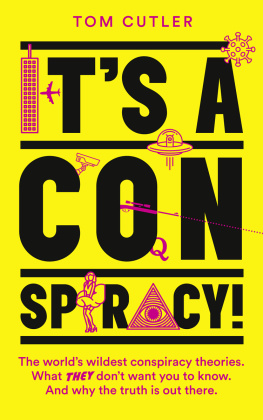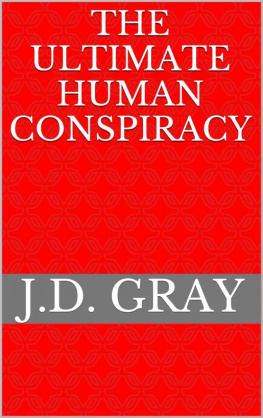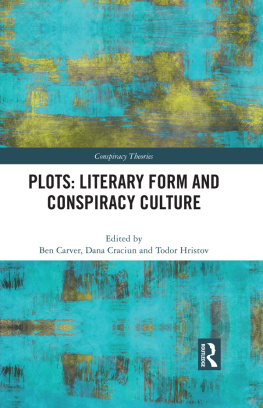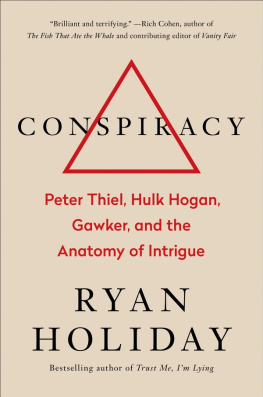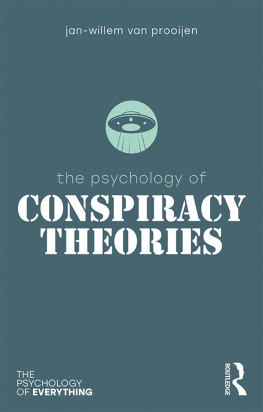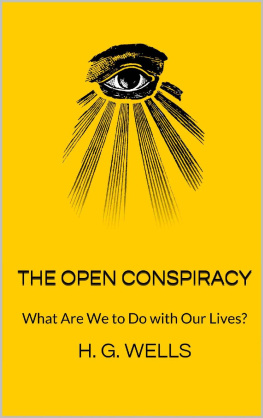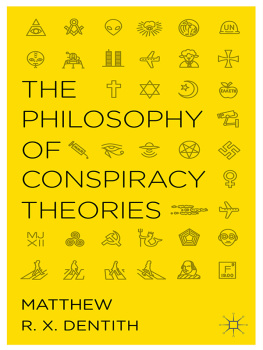PAUL NIZAN was born in Tours, France in 1905, the son of a railway engineer. A close friend of Sartre at the Lyce Henri IV and at the Ecole normale suprieure, he joined the Communist Party in the late 1920s and became one of its best-known journalists and intellectuals. His works include Aden, Arabie; Les Chiens de Garde; Antoine Bloy; and Le Cheval de Troie. In 1939, following the Molotov Ribbentrop Pact, Nizan left the party and was killed the following year in the Battle of Dunkirk fighting against the German army.
In The Conspiracy, Nizan draws on cultural, political and historical sources that will often be unfamiliar to English-speaking readers, half a century after its original publication. A few explanatory notes have, therefore, been provided at the end of the book, to which readers may if they wish refer but without burdening the text of the novel itself with any inappropriate apparatus of reference numbers.
Perhaps the most important thing to explain is something about the French system of higher education, in which a particular role is played by a group of elite Grandes coles in Paris, most of which go back in their present (approximate) form to the Revolutionary or Napoleonic period, and which flank the University of Paris (Sorbonne). Rosenthal and his friends attend what is still the best known of these, the Ecole normale suprieure in Rue dUlm. This is entered by annual competition, open to pupils from lyces (roughly equivalent to grammar or high schools) all over France. However, certain well-known Parisian lyces like the Louis-le-Grand of this book (which the author himself attended with Jean-Paul Sartre in the early twenties, and which stands next door to the Sorbonne) specialize in preparing for the Ecole Normale Suprieure entrance: pupils from less prominent lyces throughout the country transfer there at the age of eighteen for this purpose. At the Ecole Normale Suprieure, students are prepared not simply for a first degree (licence), but also for the more difficult agrgation, a competitive examination which qualifies successful candidates to apply for a strictly limited number of teaching posts (in history, mathematics, philosophy, etc.) in lyces posts which carry higher salaries than those open to teachers who only have ordinary degrees.
Other Grandes coles figuring here include the Ecole Nationale des Chartes, for archivists and librarians; the Ecole Libre des Sciences Politiques (now the Institut dEtudes Politiques) in Rue Saint-Guillaume; the Ecole Polytechnique (familiarly known as X), which has a military status and qualifies pupils either for technical branches of the armed services or for engineering branches of the public services, through an education specializing in mathematics and the physical sciences; and, in the domain of technical and vocational education, the Ecole Centrale des Arts et Manufactures and the Conservatoire National des Arts et Mtiers.
The Conspiracy is set in the political context of France between 1924 and 1929. In 1924, the Right-dominated Horizon-Blue Chamber (so called after the colour of the French Armys field uniform between 1915 and 1927) was replaced in general elections which led to a coalition government of the Left Cartel. Poincar, the conservative politician most identified with Frances hard line towards defeated Germany and in particular with French occupation of the Ruhr (1923), was replaced as Premier by the Radical-Socialist Herriot, while Millerand was similarly replaced as President by Doumergue. By 1925, however, the Right held governmental power once more, with a series of ministries headed for the most part either by Briand (192526 and again in 1929) or Poincar (192629).
I should like to express my gratitude to Christine Donougher, Marie-Thrse Weal, and especially Madame Rirette Nizan, for their kind help when I was finalizing this translation.
Foreword: On The Conspiracy
Nizan speaks about youth. But a Marxist has too much historical sense to describe an age of life such as Youth or Maturity in general, just as it marches past in Strasburg Cathedral when the clock strikes midday. His young men are dated and attached to their class: like Nizan himself, they were twenty in 1929 the heyday of prosperity in the middle of the post-war period that has just ended. They are bourgeois, sons for the most part of that grande bourgeoisie which entertains anxious doubts about its future, of those rich tradespeople who brought up their children admirably, but who had ended up respecting only the Spirit, without thinking that this ludicrous veneration for the most disinterested activities of life ruined everything, and that it was merely the mark of their commercial decadence and of a bourgeois bad conscience of which as yet they had no suspicion. Wayward sons, led by a deviation out of the paths of commerce towards the careers of the creators of alibis. But in Marx there is a phenomenology of economic essences: I am thinking, above all, of his admirable analyses of commodity fetishism. In this sense, a phenomenology can be found in Nizan: in other words, a fixing and description, on the basis of social and historical data, of that essence in motion which is youth, a sham age, a fetish. This complex mixture of history and analysis constitutes the great value of his book.
Nizan lived his own youth to the dregs. When he was immersed in it and it barred his horizon on every side, he wrote in Aden, Arabie: I was twenty, I wont let anyone say those are the best years of your life. He felt then that youth was a natural age, like childhood, although far more unhappy, and that responsibility for its miseries should be laid at the door of capitalist society. Today he looks back on it and judges it without indulgence. It is an artificial age, which has been made and which makes itself, and whose very structure and existence depend upon society: the age of inauthenticity, par excellence. Workers at twenty, however, are protected from it by misfortunes, by worries, by the contact they must make in order to survive: they already have mistresses or wives, children, a profession. . in short a life; once they leave adolescence, they become young men, without ever having been young people. But Laforgue and Rosenthal, sons of bourgeois families, students, live that great abstract ennui to the full. Their fatal lightmindedness and their aggressive futility are due to the fact that they have no duties and are by nature irresponsible. They improvise and nothing can engage them, not even their membership of extremist parties: . . these diversions. . had no great consequences for the sons of bankers and industrialists, who could always return to the embrace of their class.. . Very wise perhaps, if these improvisations sprang from a brief contact with reality. But they remain in the air and their authors forget them at once. Their actions are puffs of smoke, they know this and it is what gives them the courage to undertake things though they pretend not to be aware of it. What are we to call them, these undertakings so serious yet so frivolous, if not conspiracies? But Laforgue and Rosenthal are not Camelots du Roi: young bourgeois can come and make their plots at the other end of the political spectrum, even in the parties of grown men. We can see what that fine word conspiring hints at in the way of whisperings, little mysteries, hollow consequence and invented dangers. Tenuous intrigues: a game. A game that great Dostoievskyan plot hatched by Rosenthal, the only traces of which will be two incomplete and in any case totally uninteresting files at the back of a drawer. A feverish, angry game, an abortive conspiracy, that manufactured love which Rosenthal entertains for his sister-in-law. From calling it a game, moreover, it is but one short step to calling it play-acting: they lie to themselves because they know they are running no risk; they strive in vain to frighten themselves, in vain or almost to deceive themselves. I can just imagine the great, dumb sincerity of labour and physical suffering and hunger that Nizan would counterpose to their endless talk. Bernard Rosenthal who from anger and sloth has performed the irreparable actions of suicide will in fact know no other reality than the agony of death. The agony of death alone will show him but too late that he had missed love. . that. . he no longer even loved Catherine and he was going to die cheated. Yet those young people have the semblance of good intentions: they want to live, to love, to rebuild a world that is tottering. But it is at the very heart of these good intentions that the abstract, self-assured frivolity lies which cuts them off from the world and from themselves: their politics is still based only upon metaphors and shouts. For youth is the age of resentment. Not of the great anger of men who suffer: these young people define themselves in relation to their families; they tended to confuse capitalism with important people; they expect to find a world destined for great metamorphoses, but what they want above all is to give their parents a bit of trouble. The young man is a product of the bourgeois family, his economic situation and his world-view are shaped exclusively by the family.



